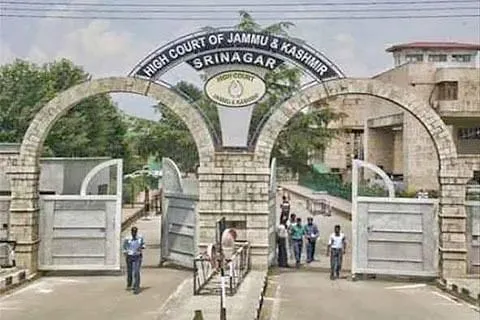The High Court on Friday asked the Union Home Ministry and J&K Government to respond within four weeks to a plea seeking the Court monitored probe by CBI into custodial death of a teacher from Awantipora area of Pulwama district in March this year.
Hearing a Public Interest Litigation (PIL) by Anti-Corruption Council of India Trust through its Managing Director, advocateKamran Khan, a division bench of Chief Justice Gita Mittal and Justice RashidAli Dar issued notices to the Union Ministry, J&K Government through itsChief Secretary, Principal Secretary Home department and Director General ofPolice.
While Assistant Solicitor General Tahir Shamsi accepted thenotice on behalf of the Union Ministry, senior Additional Advocate General, BADar accepted the notice for the top state officials, after the Court soughtstatus report in the matter within four weeks.
The plea seeks to quash the magisterial inquiry into thecase and directions to Secretary Union Home Ministry, state Home Secretary andJ&K DGP to file “Action Taken Report” in light of reports published invarious newspapers with regard to death of the teacher, Rizwan Asad Pandith.
A post-graduate in Chemistry, Pandith, who worked asPrincipal at a local private school, died in police custody in March this year.
“Prisoners have human rights and the prison torture is theconfession of the failure to do justice to a living man. For a prisoner, allfundamental rights are an enforceable reality, though restricted by the fact ofimprisonment,” the petitioner has pleaded. Advocate Tawheed Ahmad Sofi appeared on behalf of the petitioner.
Grounds raised in the PIL
The petitioner has pleaded that Pandith’s death was a”cold-blooded murder as he died in police custody at Srinagar”.
“It is a matter of great concern and also gross violation offundamental rights guaranteed under articles 21 and 22 of the IndianConstitution. It creates suspicion on the acts of police officials, as afterthree days of the death of Pandith an FIR was lodged against the deceased foran attempt to escape from the police vehicle on way to a location in southKashmir for searches,” the PIL said.
“…it is surprising and shocking that the FIR has not beenlodged in any of the three main police stations of Pulwama district,Awantipora, Pampore and Tral but instead it has been lodged at Khrew policestation. The police said that Pandith was picked up in a militancy related caseregistered at Pantha Chowk, but it is unable to convince how the arrest wasmade two years after the attack in which both the accused militants werekilled. It is also pertinent to mention that Pantha Chowk Police Station is onCCTNS and according to sources no entry was made in the case file,” said thePIL.
The post mortem report, the PIL said, revealed the Principalhad died at least 12 hours before the examination.
The initial post mortem report findings revealed thatPandith died because of “extravasation of blood” – the leakage of blood from avessel into the surrounding tissues – caused by multiple injuries, it said.
The petitioner has submitted that the Police have also notcomplied with the requirements of the Supreme Court guidelines as laid in acase titled DK Basu versus Government of West Bengal in 1997 case.
In the judgment delivered in the case the Apex Court hadruled that Police will have to produce any person before the magistrate within24 hours of his detention, the petitioner said.
“There is gross misuse of power and position on the part ofState Government as it failed to answer why probe was first ordered in Srinagarand then shifted to Pulwama. However the custodial death of Pandith occurred inSrinagar district which is itself a prima facie and well conspiracy on the partof State administration and police officials,” the PIL reads, adding more thanthree months have elapsed but the family of the victim was waiting for justice.
The petitioner informed the Court that he had filed a writpetition before the Supreme Court. However, the Apex Court dismissed thepetitioner giving him a liberty to approach J&K High Court under Article226 of the Constitution of India, he informed the Court.






